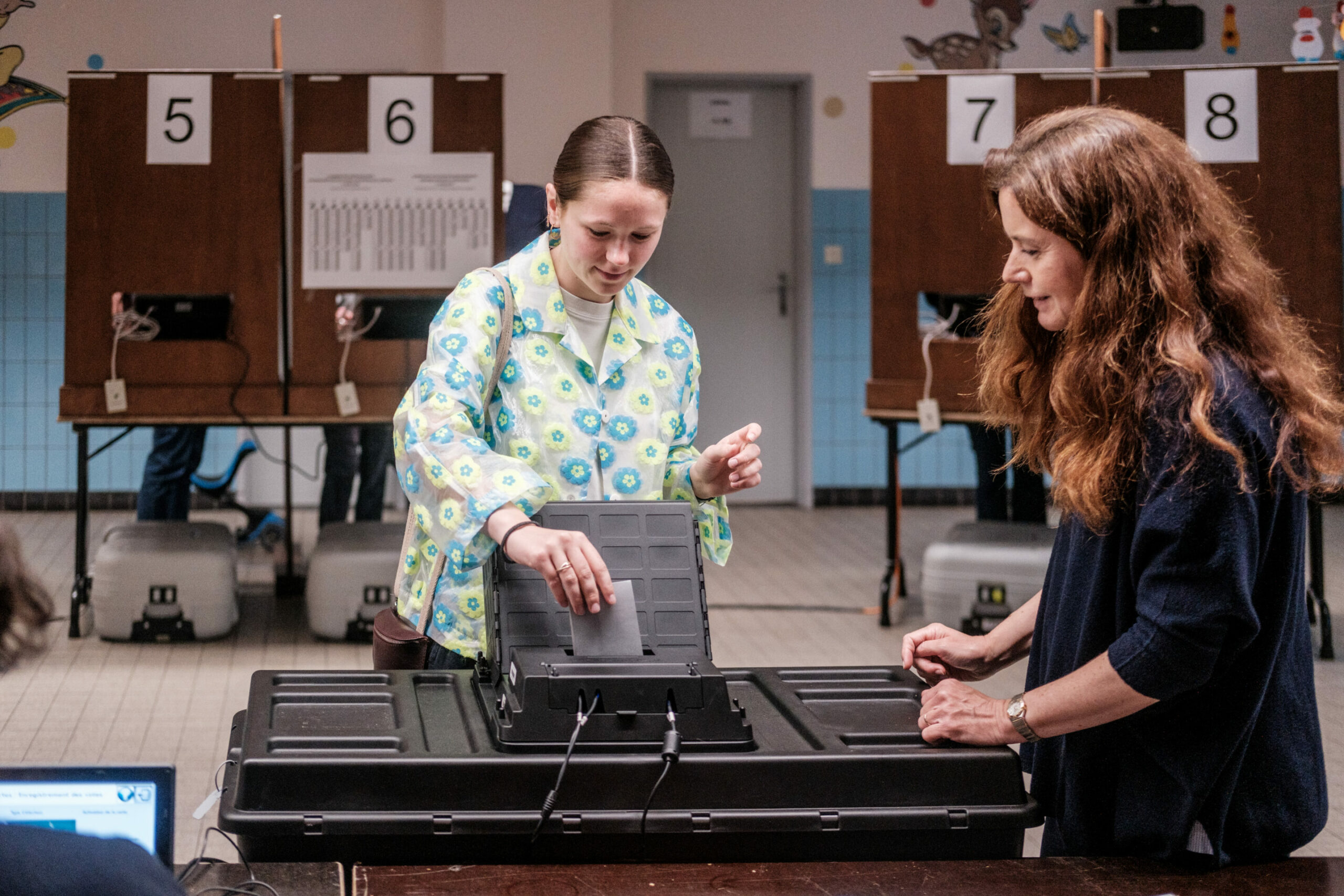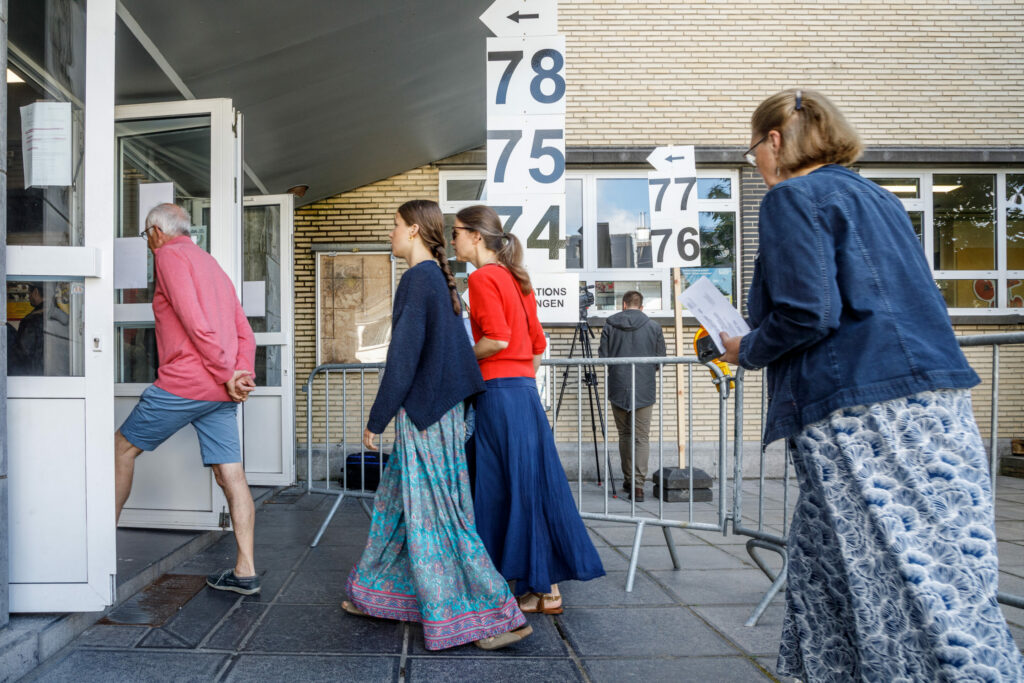A total of 8,359,908 Belgian citizens were called to vote on Sunday, including 244,957 16 and 17 year-olds who could vote in the European elections. The Brussels Times was on the streets of the Belgian capital, speaking to voters about their election hopes and concerns.
Brussels is by far the youngest region in Belgium with an average age of 37.7 years – much lower than the Flemish average (43) and Walloon average (41.7). The Brussels Times spoke to younger generations on Sunday 9 June, asking their feelings about on the day and what they believe should be the priorities for future governments.
First-time voters
For the first time, 16 and 17 year-old Belgians and EU citizens could vote in the European elections. Around 245,000 people in this age group were obliged to vote for 22 MEPs of the 705 sitting in the European Parliament.
Approached by The Brussels Times at an Etterbeek polling station, Max (16) was rushing home to study for an exam on Monday. He was unhappy with the compulsory voting system in Belgium and said it should be a choice, as in many other EU Member States (Belgium is one of four where voting is mandatory).
He had just voted for the liberal Francophone party Mouvement Réformateur (MR), a decision he made after completing an online survey to see which party's domestic programme best aligned with his personal convictions. "I like that they want to make life easier for people," he explained. "Belgium has a complicated system and they want to simplify the rules for opening a business and buying a home."

A young girl woman casts her vote at a polling station in Woluwe-Saint-Pierre. Credir: Hatim Kaghat.
Two teenage girls from Belgium, who preferred to remain anonymous, were also voting for the first time at their local polling station in Ixelles. They showed more enthusiasm for exercising their democratic right: "It’s the first time I’ve voted so I feel grown up," said one (17), adding that she voted centre-right in the European elections.
Her friend (19) added that it is a "bit stressful" knowing who to vote for. "I also feel grown up and it was a bit stressful to decide who to vote for because I feel we're in such a difficult political period. But I was just happy to be able to take part in this election."
Tactical voting
Nationally, people in Belgium are voting for the next regional and federal governments. In Brussels, voters have a wider choice of political parties than elsewhere in the country, with the choice between voting in the Dutch-speaking and French-speaking electoral lists. People voting for a Dutch-language list in Brussels get an extra vote as they have to also elect Brussels members of the Flemish Parliament, who get six seats. These MPs can only vote on Flemish Community matters.
Timour, a 32-year-old native French speaker, was happy with the tactical voting possibilities enjoyed by Brussels residents. "I decided to split my vote. Despite being a French speaker, I voted for the Flemish Green Party in the regional elections in the hope of preventing the far-right Vlaams Belang from getting a majority," he told The Brussels Times at a polling station in Saint-Gilles.
17 of the Capital Region's seats (roughly 20%) are reserved for Dutch speakers in the Brussels parliament. "On the Federal level and in European elections I voted for [the French-speaking Green party] Ecolo. For my generation, climate policy is a key issue. I believe it should be a key point in every decision that is being made but during this election it seems to have been a lesser priority. Many parties didn't address it in debates but just focussed on their base, saying what their loyal voters wanted to hear without looking at the bigger picture."

Tibo (left) and Matthieu (right). Credit: The Brussels Times
In Etterbeek, two young Flemish men also decided to vote tactically in the federal elections. "Vlaams Belang is going to make gains," said Matthieu. The 25-year-old is originally from Ghent and voted for Flemish socialist party Vooruit. "I don’t have much faith in politics but I would vote even if it weren’t compulsory, to prevent the rise of the far-right and to preserve liberalism."
One of the most important issues for Matthieu was raising the minimum wage. Meanwhile, Tibo (27) from West Flanders believes the environmental agenda must be protected at the European level. He voted for Groen on the European ballot but gave his Belgian vote to Vooruit. He describes this as "a vote against the far-right", arguing that the right-wing party N-VA might turn to the socialists rather than Vlaams Belang in coalition talks.
Spectrum of ideologies
Another Belgian, Aaron (29), voted for different parties depending on the level of government. He voted MR and Open VLD in the Belgian elections and the Green Party at a European level.
"I think the budget deficit is a big issue, as is making sure that working is much more financially rewarding than not working," he told The Brussels Times at a polling station in Ixelles. He also stressed the need for legislators to unite in limiting global warming, making the right decisions and "taking everybody forward together".
He said it is difficult to find a party representing the main issues he cares about, which are mainly economic and environmental. He said he would love to vote for the Greens in Belgium but is less confident in their economic policies.
Role of mandatory voting
People in Belgium are obliged to go to polling stations and enter the voting booth, but it is not mandatory to cast a vote. People who do not show up at the polling station without a valid reason risk a penalty of €40 up to €80. Those who fail to show up four times in 15 years can lose their right to vote for ten years.
Tibo sees Belgium’s compulsory voting system as a bulwark against extremes. In his view, an optional voting scenario would see moderate parties disappear because "followers of parties on the extreme right and left are more motivated to go out and vote".
Similarly, Timour said he believed mandatory voting is a good system: "Even if you struggle to decide what party to vote for, this is a chance to make your voice heard." He argued that in other countries, many people who don't vote end up complaining about their local political situation. "They don't have the right to complain because they didn't participate politically. I think that fewer people in Belgium complain about this; I believe this is because they exercise their right to vote and think voting is the right thing to do."

